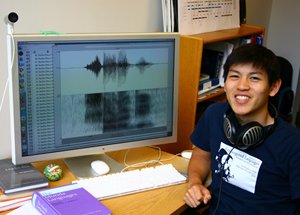Students Work with Linguist David Harrison to Archive Endangered Languages
Students Work with Linguist David
Harrison to Archive Endangered Languages
by Michael Gluk '12
7/28/11

With the help of student workers this summer, Associate Professor of Linguistics K. David Harrison is continuing work at his Laboratory for Endangered Languages to archive languages that threaten to disappear from use. By creating online talking dictionaries and cataloging the language's geographical and cultural data, they hope to provide resources for communities of endangered language speakers to preserve and teach their native language to future generations.
One recently completed project is a "talking dictionary" of the Remo language, spoken by fewer than 9,000 people in Orissa, India. "This will give a huge boost to the visibility of the language and its culture, as well as encourage future generations to continue learning and speaking it," says Andrew Cheng '12, whose work in Harrison's lab is supported by a William L. Huganir Summer Research Stipend on Population Issues. Harrison's project is affiliated with the larger Living Tongues Institute, a global nonprofit dedicated to the documentation and preservation of endangered languages.
This focus on endangered languages stems from Harrison's primary research interest in how languages structure human knowledge. His research for the past several years has focused on emergent patterns within various languages' sound and word systems. "As a responsible scientist, I am eager to raise awareness about language extinction," he says. "The loss to science, to humanity, and to the native communities themselves will be catastrophic."
The loss to the world represented by the death of a language may not be immediately obvious but, with the extinction of a language, Harrison argues, comes the extinction of a unique way of thinking. "The extinction of ideas we now face has no parallel in human history," he writes in When Languages Die (2007). "Since most of the world's languages remain undescribed by scientists, we do not even know what it is that we stand to lose [...] the vast knowledge that will soon be lost [is] an accretion of many centuries of human thinking about time, seasons, sea creatures, reindeer, flowers, mathematics, landscapes, myths, music, infinity, cyclicity, the unknown, and the everyday."


